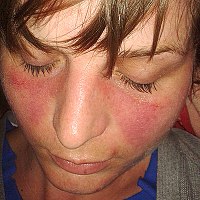
Photo from wikipedia
Objective Numerous studies indicate that immune-related genes (IRGs) are closely related to tumorigenesis and tumor progression. We aimed to establish a robust IRGs-based signature to predict risk of recurrence for… Click to show full abstract
Objective Numerous studies indicate that immune-related genes (IRGs) are closely related to tumorigenesis and tumor progression. We aimed to establish a robust IRGs-based signature to predict risk of recurrence for patients with laryngeal squamous cell carcinoma (LSCC). Methods Gene expression profiles were acquired to select differentially expressed IRGs (DEIRGs) between tumor and adjacent normal tissues. Functional enrichment analysis was performed to explore the biological roles of DEIRGs in LSCC. Univariate Cox analyses and LASSO regression model were used to construct a IRGs-based signature with the ability to predict recurrence for LSCC patients. Results A total of 272 DEIRGs were identified, of which 20 DEIRGs were significantly associated with recurrence-free survival (RFS). Subsequently, we constructed an eleven-IRGs signature that could classify patients into high-risk or low-risk groups in TCGA-LSCC training cohort. Patients in high-risk groups suffered from shorter RFS (log-rank p = 9.69E−06). Besides, the recurrence rate of high-risk group was significantly higher than that of low-risk group (41.1% vs. 13.7%; Fisher’s exact test p < 0.001). The predictive performance was validated in an independent cohort (GSE27020, log-rank p = 1.43E-03). Person correlation analysis showed that the risk scores calculated by eleven-IRGs signature were significantly associated with filtrating immune cells. Furthermore, three immune checkpoint molecules were significantly over-expressed in the high-risk group. Conclusion Our findings for the first time constructed a robust IRGs-based signature to precisely predict risk of recurrence and further provided a deeper understanding of IRGs regulatory mechanism in LSCC pathogenesis.
Journal Title: International Journal of Immunopathology and Pharmacology
Year Published: 2023
Link to full text (if available)
Share on Social Media: Sign Up to like & get
recommendations!